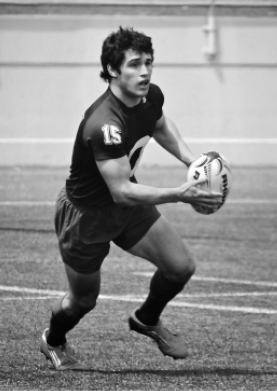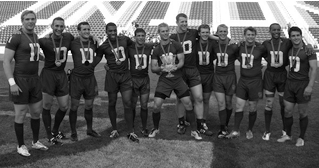For Madison Hughes ’15, captain of the Dartmouth Rugby team, leadership is nothing new. Along with being the first junior captain in Dartmouth Rugby’s history, Hughes has been named captain of both the Collegiate 7’s All-Americans in 2013 and the Collegiate 15’s All-Americans in 2014. Now, at 21 years old and the youngest member of the USA Rugby Eagles 7’s, Hughes has earned that title once again. Hughes will be leading the Eagles in the Gold Coast 7’s tournament this week in Australia. The Review sat down with Madison to discuss his experiences on both the national team and at Dartmouth.
The Dartmouth Review (TDR): How was the national team put together?
Madison Hughes (MH): The coaches put on a series of camps over the summer. We had three one-week camps, the last two of which I was able to attend. There were sixty-one guys that came to the first one and twenty-five by the last one. At the end of that camp I was named captain for this tournament. Twelve people will travel to the tournament and three are named as reserves in case someone gets hurt between now and when we leave.
TDR: What’s it like being the captain and the youngest player on the team?
MH: It’s interesting being the youngest guy on the team and the captain. Two guys of the twelve have been captain before and they’re both guys that I hugely respect and look up to and get along with really well. I was a bit surprised to be named captain but it’s a huge honor and it means that they see something in me, as I’ve only played in four tournaments while some guys have played in almost fifty.
TDR: Why do you think you were named captain?
MH: I think it’s just the way the team is looking right now and the way I’ve been interacting with the team that it makes the most sense right now. We’re trying to get to new heights and be more successful than we ever have been in the past. We have a new coach, and we’re very excited and believe we can do it. I think we’re going in a new direction as we make the next step in our journey.
TDR: What are the team’s goals this year?
MH: Last year we came thirteenth in the series out of fifteen teams and this year we’re aiming to do much better than that. Our minimum goal for each tournament is to make the cup quarterfinal, which includes the top eight teams.
For this season the top four teams from the series automatically qualify for the Olympics, and that’s our real aim. We want to position ourselves to be competing for a medal in 2016.
TDR: What does the team have to do to achieve those goals?
MH: It’s about making big improvements. Last year, while we played well at times, everyone would say we were disappointed with how we achieved on a consistent basis. There were chances we got last year which we may have let slip and we want to capitalize on those opportunities this year.
If we played as well as we were capable, we could have been in a situation where the players decided the game rather than being in a situation where the ref could intervene. We have the talent, the experience, the intangibles, and the little things to be successful. It’s just about putting that into action.
TDR: How does the team think about playing on the international stage?
MH: We’re playing against the best teams in the world, so we know it’s going to be difficult, but we’re putting ourselves in the best position to succeed. Most of the guys on the team have been playing rugby for some time now. There are a few guys who picked it up in college and a couple even after that but for the most part it’s guys who’ve played growing up, at least through high school. I’ve been playing since I was 7. We’re not really intimidated by the teams out there. We know they’re good but we know we’re good too. If we perform to the best of our abilities we really think we can hang with any team out there.
TDR: How are you balancing playing rugby at the highest level with being a full time Dartmouth student?
MH: The timing actually works out well for me since I’m planning to take this winter off to be in the national team residency program in San Diego. Most of the tournaments occur after this term and the next one is the first week in December. In January there’s Las Vegas and in February there’s Wellington. Then Tokyo and Hong Kong in late March and early April.
I cleared the time I was going to be missing with my professors before the start of the term. I’ve had professors that have been willing to work with me, which has been really nice. They understand that I want to pursue rugby at the highest level but that I also want to get my degree and complete my studies at Dartmouth. Professors recognize that I’m willing to work with them and put in extra effort when I’m here to make up for the time I miss. I’m now cramming a ten week term into eight weeks, and ten weeks is already short!
TDR: So will you graduate late?
MH: I’m actually still on course to graduate at the end of the spring. I took classes both my sophomore and junior summers and also came in with a couple credits.
TDR: What’s it like getting your work done while in training?
MH: It can be tough after a long day of training to work. You do your recovery and get in the ice bath and then you have to get out and do 200 pages of reading. It can be tough at times but it’s the choice I’ve made. When I am here it makes things more intense because maybe there were some readings I wasn’t able to do after a really intense day of training. There’s a catching up period when I get back but I try to get ahead before I leave by doing extra work. It adds an extra level of stress, but I want to be playing rugby to the highest level I can while also pursuing my degree at Dartmouth. Balancing those things is what I’m doing.
TDR: How have you balanced playing for Dartmouth as well as the Eagles?
MH: I’ve had to miss a few games this fall. Last week when we played Harvard I returned from a camp in San Diego just in time for the game. I wasn’t able to play in that game but the team has done very well without me. I’ve been watching the team carefully and they’re looking in good nick. I will miss a few games but I will hope to be here as much as I can. I’m really excited about where the team can go even without me there.
TDR: What about captaining two teams at the same time?
MH: It is a bit of a balance. I recognize that it isn’t ideal that I’m captain of the Dartmouth team despite being away for significant amount of time, but it means that when I’m here I try to make as much of an impact as I can and maintain a positive presence. When I’m away I’m touching base and checking how practices are going. Pete Savarese ‘15 and Mike McDavid ‘15 have both been huge leadership presences in my absence, and have filled any void magnificently.
TDR: How was playing in the Hong Kong tournament last year?
MH: Hong Kong is known as the home of 7s. It’s a huge tournament. It’s been going on for about 40 years and has been integrated into the [IRB Sevens World] Series for the last 15 years or so. From what I’ve heard, people in Hong Kong say it’s one of the biggest events on the calendar and they look forward to it all year. It’s a forty thousand seat stadium that’s completely packed. The south stand is notorious for some of the behavior that goes on there. Playing in there was really wild and at some times you can barely hear yourself think. It’s a lot of fun.
TDR: What’s it like playing in front of that crowd after playing at Brophy Field?
MH: The crowds add a different perspective. We get a good crowd at Brophy but it’s not 40,000 people screaming at you. Still, it’s hard to beat the picturesque setting of Brophy. You’ve got all the trees in the background and the leaves turning color in the fall, it’s quite magnificent!
TDR: How has playing at Dartmouth prepared you for the international stage?
MH: I’ve become an immeasurably better rugby player at Dartmouth and that’s helped me so much in the higher levels. When I came to Dartmouth I thought I was pretty good but in hindsight I wasn’t nearly as good as I thought I was. I’ve just improved in almost every facet of the game. It’s hard to pinpoint one or two things that I’ve learned and that’s helped me because all my skills have developed so much. My game sense, my decision-making, and my ability to read the game and put my teammates and myself in good spots to succeed. That’s something that I’ve really improved upon at Dartmouth and that has really helped me in my higher level play. The coaches, the practices, and working with my teammates to get those extra reps in have all helped me develop. My passing is so much better now, my kicking is at another level, and my ability to read the game and view the picture of what I’m seeing on the field and make the right read and decision for each situation has really improved.
TDR: How do you compete against the speed and size of ruggers on the other national teams?
MH: There are lots of guys bigger and faster than me, so what I bring to the table is a decision-making ability and the ability to make the right reads under pressure. It’s definitely something I’ve improved upon in the past few years and something I will look to continue to improve upon in the next few years.
TDR: What are your thoughts headed into this tournament?
MH: This is my first tournament as captain. I’m really excited. Running out onto the field with the eagle on your chest and representing USA is a huge honor and something not many people can say they’ve done. I’m hugely grateful for the opportunity I’ve had and those that I will hopefully continue to get. Being captain of the USA team is incredible and something I’m very proud of but I’m also very conscious that I must continue to earn it.
I can’t wait to run out there and lead the team and do the best we can do.
Caelan D. Corr also contributed to this interview.



Be the first to comment on "A Conversation with Madison Hughes"